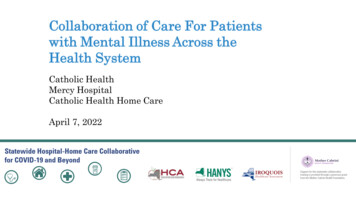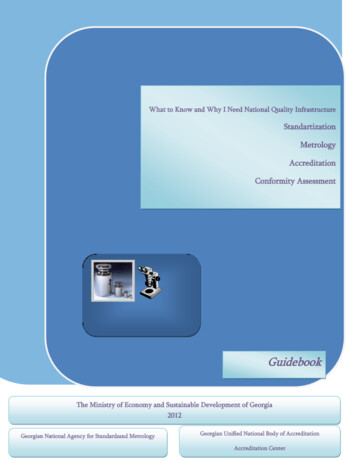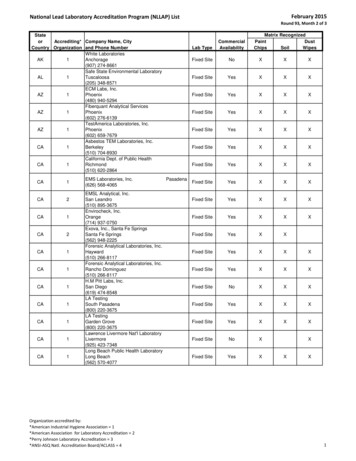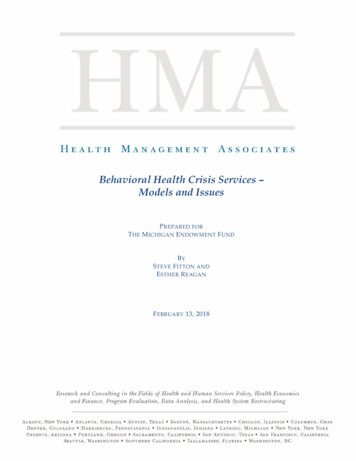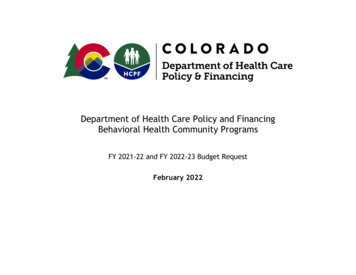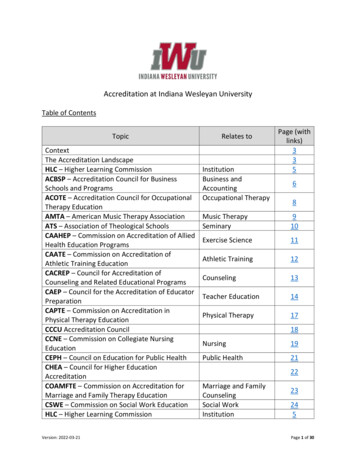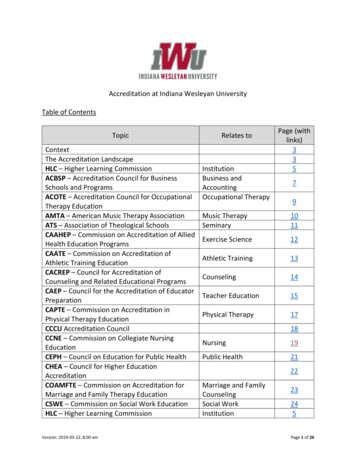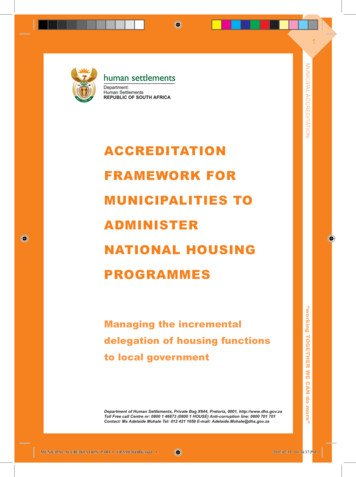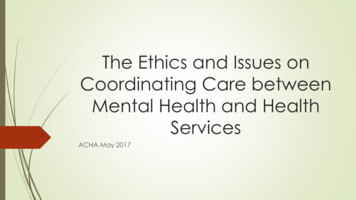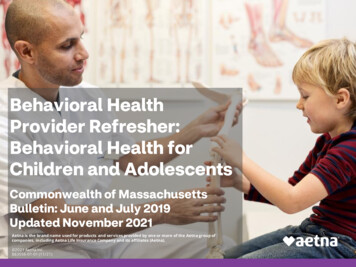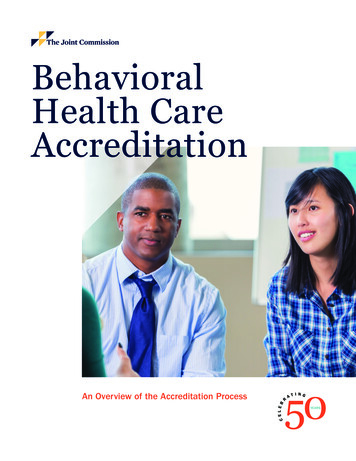
Transcription
BehavioralHealth CareAccreditationAn Overview of the Accreditation ProcessLCE EBRI NGATYEARS
The Value of JointCommission AccreditationThe Joint Commission Past and PresentFounded in 1951, The Joint Commission is the nation’s leader in accreditation, with more than65 years experience across the full spectrum of health organizations. The Joint Commission is anon-governmental, not-for-profit organization accrediting or certifying over 21,000 health careorganizations or programs.Beginning in 1969, The Joint Commission established the Behavioral Health Care AccreditationProgram to encourage safe, high quality care, treatment or services to individuals receiving mentalhealth or addiction treatment services. Joint Commission accreditation is a widely recognizedstandard for quality services. Today, The Joint Commission accredits over 3,000 behavioral healthorganizations across the U.S. in a wide variety of settings.2
The Joint Commission and its Gold Seal of Approval are a widely recognized benchmarkrepresenting the most comprehensive evaluation process in behavioral and physical health care.The Joint Commission’s role in behavioral health care and human services is well establishedand nationally renowned. Joint Commission accreditation benefits your organization by:Giving you a competitive advantageImproving liability insurance coverageAchieving Joint Commission accreditation is aBy enhancing risk management efforts, accreditation maystatement to the community and the people you serveimprove access to, or reduce the cost of liability insurancethat your organization is committed to providing care,coverage. Find a list of liability insurers that recognizetreatment, or services of the highest quality. It helps setJoint Commission accreditation atyou apart from other behavioral health organizationswww.jointcommission.org/BHCins/and provides a mark of distinction.Helping organize and strengthenAssisting recognition from insurers,your improvement effortsassociations, and other third partiesAccreditation encompasses state-of-the-art performanceMany payors, regulatory agencies, and managedimprovement concepts that help you provide and continuouslycare contractors require Joint Commission accreditationimprove your process of care, treatment or services.for reimbursement, certification or licensure, and as akey element of their participation agreements. OthersEnhancing staff educationrecognize Joint Commission accreditation in lieu ofThe accreditation process is designed to be educational.their own surveys, reducing duplicate events.Joint Commission surveyors offer suggestions forapproaches and strategies that may help your organizationbetter meet the accreditation requirements and providestate-of-the-art operations.TYPES OF SETTINGS ACCREDITEDBelow is an example of some of the programs and settings accredited under The Joint Commission’sBehavioral Health Care accreditation program.–– Addictions services/programs–– Eating disorder treatment–– Behavioral health homes–– Foster care–– Community mental health centerspromotion services(traditional and therapeutic)–– Group homes–– Crisis stabilization–– Mental health rehabilitation–– Day programs (intensive outpatient–– Services that supportrecovery and resilience–– Corrections services/programs(24-hour acute care)–– Prevention/health(community support) services–– Opioid treatment programsservices, adult day care, partial–– Outdoor behavioral health programshospitalization programs, etc.)–– Outpatient programs–– Technology-based(online) services–– Therapeutic schools(Day or 24-hour)–– Transitional/supervised/supportive livingDon’t see your setting or services? We can help. Call 630-792-5771.BE H A VI O R A L H E A LT H CA R E A CCR E DI T A T I O N3
ApplicationFeesThe cost of accreditation is based onthe on-site survey fee, plus an annualEligibility for AccreditationAny behavioral health care organization may apply for Joint Commissionaccreditation under the standards in the Comprehensive AccreditationManual for Behavioral Health Care (CAMBHC) if the followingfee each year. The annual fee for anrequirements are met:organization is determined based on–– For organizations providing foster care, the organization has a minimumthe organization’s size and complexity.Additionally, organizations arebilled an on-site survey fee after thesurvey has been performed. Theon-site survey fee is designed to coverthe costs of performing a survey; itis due upon receipt.BillingProcessof three foster homes with two homes caring for at least one individual.–– For organizations providing methadone detoxification, at least threeindividuals have been treated.–– For all other organizations, three individuals, with at least two active atthe time of the initial on-site survey, have been provided care, treatmentor services.Not sure you meet eligibility requirements?We can help. Call 630-792-5771.The Joint Commission accreditationcycle is 3 years and the cost ofaccreditation is divided over this3-year period. Generally, customerscan expect to pay 60% of theaccreditation fee for the first year(on-site survey fee plus annual fee),20% the second year (annual fee),and 20% the third year (annual fee).Applying For AccreditationApplicationThis electronic document provides us with essential information aboutyour organization, including: ownership, demographics, and types andvolume of services/programs provided, which helps us plan your survey.Your Joint Commission application for accreditation is housed on a secureorganization-specific extranet site called Joint Commission Connect thatApplication &DepositThe application is submitted witha 1,700 deposit, which is appliedtoward your accreditation fee. It canbe paid by check or credit card viamail, phone or online. This deposit isnon-refundable and non-transferable.is found at www.jointcommission.org.Requesting an ApplicationTo request an application:–– Phone: 630-792-5771 or email: BHC@jointcommission.orgAccessing and Submitting the ApplicationAfter your request is processed, you will receive an email providinglog-in information to access the application. (See 1 next page). Whencompleting the application for accreditation, you should identify all ofthe services/programs that you provide and the location of each site. It isTo calculate your accreditationfees, please request thebehavioral health careaccreditation fees worksheetfrom us at (630) 792-5771 orBHC@jointcommission.org; orcall the Pricing Unit at(630) 792-5115.4important that all these are listed so The Joint Commission can determinewhich accreditation requirements apply to your organization and assignappropriate surveyor(s) for an appropriate number of days.Once complete, submit the application with a 1,700 deposit, which isapplied toward your cost of accreditation. Submitting the applicationwithout the deposit will delay the scheduling of your on-site survey.
Accreditation Preparation & SupportThe Joint Commission wants you to succeed with your accreditation. To help you prepare, The JointCommission offers a variety of hands-on support and technical resources.Joint Commission Connect 3 Survey Activity GuideJoint Commission Connect is a personal extranet site,Accessible via Joint Commission Connect, the Surveydedicated to supporting your organization.Activity Guide is dedicated to preparing you for the on-site1 Here your organization can access the application,make fee payments, and maintain accreditationvisit and includes:–– Survey Activity Detailsexpectations throughout your ongoing relationshipA thorough, detailed description of the events thatwith The Joint Commission.comprise a typical 2-day on-site review.2 Account Executive ListingOnce you obtain access to Joint Commission Connect,you will be assigned a behavioral health care AccountExecutive who will:–– Be the primary contact between your organizationand The Joint Commission–– Coordinate the planning and scheduling of your–– Sample Survey AgendaA helpful, hour-by-hour outline of the survey, showingyou what to expect, whom to have available and whatyou’ll need throughout the on-site visit.–– Ready-to-Go ListA list of specific documents and information you’llneed for the surveyor planning sessions on day oneof your survey.on-site survey–– Cover policies, procedures, accreditationissues or services, and inquiries throughout theaccreditation process–– Update changes to your demographicinformation including address, contact name(s),services, etc.–– Support your post-survey activities.213Standards Interpretation Group (SIG)This group functions as a standards “help desk.” Contact SIG for information about interpreting andapplying any behavioral health accreditation requirements including Performance Improvement, LifeSafety Code, or Care, Treatment or Services. This resource is available through the Joint Commissionwebsite at www.jointcommission.org/standards information/jcfaq.aspxBE H A VI O R A L H E A LT H CA R E A CCR E DI T A T I O N5
Your On-site SurveyScheduling yourEarly Survey OptionThe Joint Commission’s accreditationFirst SurveyThe Early Survey Policy allows anprocess helps organizations improveYour first Joint Commissionorganization new to Joint Commissionthe safety and quality of care,treatment or services. The processbegins with an on-site surveythat assesses compliance withJoint Commission accreditationrequirements. Typically, on-sitesurveys are conducted by one surveyorfor two to four days, and involvethe following:–– ‘Tracing’ the individual served’sexperience – looking at programsand services provided by variousstaff and departments within theorganization, as well as ‘hand-offs’between them–– On-site observations and interviewswith staff, individuals served, andfamilies (where appropriate)–– Review of documents provided byaccreditation survey needs to bescheduled within twelve months fromthe time we receive your applicationfor accreditation. In the application,you’ll indicate the date you will beready for your initial on-site survey.The Joint Commission will thenschedule the survey as soon thereafteras possible.You can also indicate 15 dates thatyou would not like the survey to beconducted. Your account executivewill work with you to schedule yoursurvey, and you will have at least 30days notice of the exact date that thesurveyor(s) will be there.Please note that the accreditationaccreditation to enter the accreditationprocess in two stages. Available fornew organizations and for thosealready established, the Early SurveyOption is different than a normal,full survey in that this optionconsists of two on-site visits. Foran organization not yet providingcare, treatment or services, thisoption makes it possible to set up thebusiness operations on a foundationof compliance with administrative andorganizational requirements beforethe first individuals are served. For anestablished organization it providesaccreditation with more intensiveconsultation/education during the firstof two surveyor visits.award will always be for a three-yearterm.the organization–– Assessment of the safety of thephysical facility, if applicable“Bottom line, Joint Commission accreditation helps us attract referralswho might not look at us otherwise. The Gold Seal gives us instantcredibility. We have facilities in different parts of the country, andwhen families choose a location, they know that each program providesthe same high quality care no matter where it is located.”6Joint Commission Customer
Your Surveyors: Behavioral Health Care ProfessionalsJoint Commission Behavioral Health Care field surveyorsThe Joint Commission evaluates its surveyors’ performanceare behavioral health care professionals who understand thecontinually throughout the year. Many Joint Commissionday-to-day issues that confront you and have the hands-onsurveyors are also currently practicing in the behavioralexpertise to help you resolve them. The Behavioral Healthhealth care field and thus appreciate your organization’sCare surveyor cadre is composed of psychologists, socialmission as well as understand your perspective of theworkers, behavioral health care nurses, and administratorsaccreditation experience.with experience in behavioral health care. Each surveyorconducts approximately 12 - 15 site visits per year. ThisTracer Methodologyextensive experience helps them collect and share goodThe Tracer Method is a key component of every on-sitepractices across organizations.survey. It uses the individual’s care, treatment or serviceThe Joint Commission ensures surveyor consistency byproviding several weeks of initial training and supervisionfollowed by yearly continuing education to keep surveyorsup-to-date on advances in quality-related performanceevaluation. A rigorous training process and certificationexamination must be successfully completed beforebecoming a Joint Commission behavioral health surveyor.This ongoing training and supervision helps ensure thatyour on-site survey is an educational process, not just acompliance exercise.experience as the basis from which to assess compliancewith applicable accreditation requirements. The surveyor(s)will follow the individual’s experience with care, treatmentor services throughout the organization. Tracers allow thesurveyor(s) to identify performance issues in one or more ofthe steps of the care, treatment or service process.SAFER MatrixYour post-survey findings will be plotted on our proprietarySAFER matrix, which allows you to easily identify their risklevel and how systemic the issues were found to be acrossyour organization.“I am always impressed by the experience, patience, and thoroughness of our surveyors. With The JointCommission as a partner, I feel like we have a wise mentor prodding us to do better, to think more clearly,and to be more efficient.”Joint Commission CustomerBE H A VI O R A L H E A LT H CA R E A CCR E DI T A T I O N7
Accreditation RequirementsThe Joint Commission’s Comprehensive Accreditation Manual for Behavioral Health Care (CAMBHC) is the place to beginwhen preparing for accreditation. This manual is an excellent tool to help your group become organized and established.Available online, the manual has a filtering tool so you can easily determine which accreditation requirements apply to yourorganization’s unique setting(s), program(s), service(s), and population(s). It is comprised of the following chapters, whichare found in alphabetical order.A C C R E D I TAT I O N M A N U A L C H A P T E R SCare, Treatment,and ServicesAddresses the screening/assessment of individuals served and the planningand delivery of care, treatment or services provided, as well as monitoring anddetermining outcomes of care, treatment or services provided.Emergency ManagementAddress an organization’s plans and readiness to face emergency situations.Environment of Care,Treatment or ServicesMeasure how well a safe, functional and effective environment is being maintainedfor both individuals served and staff in the organization’s facilities, if applicable.Human ResourcesManagementProcesses for staff management including competency assessment.Infection Preventionand ControlAddresses how the behavioral health provider identifies and reduces the risk ofacquiring and spreading infections among individuals served.Information ManagementHow well the behavioral health care provider obtains, manages and uses informationto provide, coordinate and integrate care, treatment or services.LeadershipReviews structure and relationships of leadership, the maintenance of a culture ofsafety, quality and operational performance.Life SafetyThese requirements apply to organizations providing a 24 hour care livingenvironment and apply only to the buildings in which individuals served sleep/live.Medication ManagementAddress medication use processes including prescribing/ ordering; preparation anddispensing (pharmacy); administration and monitoring of effect, as applicablePerformance ImprovementFocuses on how well an organization designs processes; measures its performance;assesses its performance; and, ultimately, improves its performance.Record of CareThis chapter contains requirements related to the components of a completeclinical/case record.Rights of the IndividualInformed consent, receiving information, participating in decision making, andservices provided to respect the rights of the individual served.Waived Testing8Waived tests refer to the least complex tests, approved for home use or listed inthe CLIA regulations as having a low risk for incorrect results. Covers policies, staffcompetency, quality control and record keeping.
Accessing the Accreditation RequirementsJoint Commission standards for behavioral health care settings are available in both print and electronic format and can beaccessed through a variety of means.E - D I T I O N ( E L E C T R O N I C A C C R E D I TAT I O N M A N U A L )Attributes–– Web-based accreditation manual accessed electronically–– Filters applicable standards by selection of setting(e.g., mental health facility, foster care, substance use, etc.)How to Access–– Request a 90-day trial � One free license sent upon receipt of application and depositC A M B H C ( P R I N T E D A C C R E D I TAT I O N M A N U A L )Attributes–– Standards for all Behavioral Health Care settings/programs/populations–– Applicability grid determines which standards apply toyour unique organizationHow to Access–– Purchase at: Want to view the standards? Request a free 90-day trial at http://pages.jointcommission.org/BHCE.htmlLEARN MORE ABOUT THE ON-SITE SURVEYAttributes–– Handy guide for the on-site survey process andpost-survey activities–– Features a sample survey agenda and a guide to the next stepsafter you have been accreditedHow to Access–– Download the document at www.jointcommission.org/BHCS under“The Accreditation Process”BE H A VI O R A L H E A LT H CA R E A CCR E DI T A T I O N9
Preparation Timeline: Organizations Requesting a First SurveyJOINT COMMISSION ACTIVITYUpon receipt ofyour request foran application.Email message sent with accessto the electronic applicationfor accreditation.Staff member(s) with knowledge ofyour organization’s services/programs,sites, and volume should complete andreturn the application for accreditationwith a 1,700 non-refundable/nontransferable deposit for initial survey.Upon receipt ofyour applicationfor accreditationand deposit–– You are assigned anAccount Executive.Work with your account executive toschedule your survey. It should bewithin 12 months of your applicationsubmission date.–– You will receive acomplimentary copyof E-dition, our onlineaccreditation manual.–– You are given access to acomplimentary 6-month onlinesubscription to Perspectives,the official newsletter of TheJoint Commission.10YO U R A C T I V I T YLog on and gain familiarity with your“Joint Commission Connect” extranetsite, and review the “Survey ActivityGuide” posted there for in-depthinformation on what happens during anon-site survey.30 days before theOn-Site SurveyVerification of survey datesand name(s) of surveyor(s)are communicated.Call your Account Executive promptly ifyou have questions.On-site SurveySurveyor(s) arrive for your on-sitesurvey. At the conclusion of thesurvey, you receive a copy of thesummary report, which details thepreliminary findings during theon-site survey.During the survey, staff should beavailable as outlined on the surveyagenda (See the Survey Activity Guideposted on your “Joint CommissionConnect” website).2 – 10 daysafter surveyYour final report detailingyour survey findings and yourorganization’s accreditationdecision is posted on yourorganization’s extranet site. Anemail is sent to alert you that thefinal report has been posted. Theinvoice for the on-site fee is posted.Review any findings and make plans forcorrections (submitting an Evidence ofStandards Compliance report) withinthe specified time ranges, usually60 days.
JOINT COMMISSION ACTIVITYYO U R A C T I V I T YWithin 45 or 60days after finalreport is postedThe Joint Commissionreviews any Evidence ofStandards Compliance reportsyou submitted.For any accreditation requirementsscored as partial or non-compliant,you submit your Evidence ofStandards Compliance to The JointCommission, which identifies theaction(s) taken and, if indicated, themeasure(s) of success you will trackover the next four months to showcompliance is sustained.MonthlyEach accredited organizationreceives an electronic copy ofPerspectives, which is the officialsource for updates to standards,policies, and procedures.Staff should review all changesfeatured in Perspectives to keepabreast of changes and developmentsin the accreditation requirements andsurvey process.AnnuallyInvoice for annual fee is posted inJanuary to organization’s securedextranet site.Organization updates data containedin its application for accreditation.The Focused Standards Assessmentform should be completed by theorganization and submitted to TheJoint Commission.Annually (exceptfor a year in whichan on-site surveyis conducted)Within 30 daysof any significantorganizationalchanges (asdefined in theCAMBHC)Complimentary consultation withthe Joint Commission’s StandardsInterpretation Group is available.Staff should review the updates toact on new and modified standardsand elements of performance, scoringguidelines, policies, and procedures.An update form for thispurpose can be found on theorganization’s extranet site, oremail the information to youraccount executive. A decisionabout appropriate follow-upwill be made based upon thetype and extent of the change.The organization must notify TheJoint Commission (via letter, fax, ore-mail) of any significant change inthe organization (as defined inthe “Official Accreditation Policiesand Procedures” chapter in theaccreditation manual).BE H A VI O R A L H E A LT H CA R E A CCR E DI T A T I O N11
Telephone and Website DirectoryGetting StartedManaging the Accreditation Process–– How to get started–– Completing my application–– Overall behavioral health accreditation information–– Scheduling a survey date–– Free webinars–– Specific issues related to ongoing accreditation–– Cost worksheet/price quotes–– Free trial of the standards–– Requesting an applicationCONTACT: BEHAVIORAL HEALTH ACCREDITATION TEAMPhone: 630-792-5771Email: BHC@jointcommission.orgWebsite: www.jointcommission.org/BHCCONTACT: YOUR ACCOUNT EXECUTIVEPhone: 630-792-3007Standards–– Interpreting and complying with specific behavioralhealth care accreditation requirementsAlso, visit these pages beginning withwww.jointcommission.orgCONTACT: THE STANDARDS INTERPRETATION GROUP/BHCGeneral behavioral health accreditation informationWebsite: www.jointcommission.org/Standards information/jcfaq.aspx/BHCSInformation about preparing for accreditation,including free webinarsManuals, Education, and Training/BHCAInformation about maintaining behavioralhealth accreditation–– Purchasing print accreditation manuals/BHHInformation about Behavioral HealthHome Certification–– Training resources for staff/BHCinsList of liability insurers offering discounts toaccredited organizations–– Registering for a Joint Commission education programor conferenceCONTACT: JOINT COMMISSION RESOURCES (JCR)Phone: 877-223-6866Email: jcrcustomerservice@pbd.comWebsite: www.jcrinc.comFees–– Accreditation fee questions–– How to handle my application depositCONTACT: THE JOINT COMMISSION PRICING UNITPhone: 630-792-5115Email: pricingunit@jointcommission.orgBHCAB0319
The Joint Commission and its Gold Seal of Approval are a widely recognized benchmark representing the most comprehensive evaluation process in behavioral and physical health care. The Joint Commission's role in behavioral health care and human services is well established and nationally renowned.
